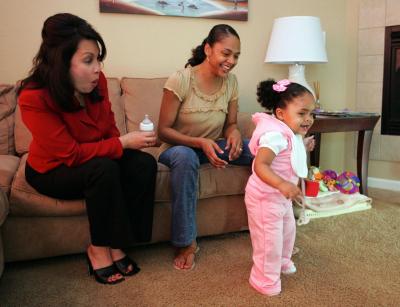
It's devastating to discover that your child — your perfect, chubby-cheeked baby — has a serious physical disability. But when you learn the condition is so rare that a phalanx of doctors is dumbstruck, you need the support of someone who has been through the same traumatic thing. Tamika Southern-Mixon's labor and delivery was fast and smooth, until the midwife spotted baby Morgan's foot dangling by a shred of tissue. Then the tiny
limb turned green. "I knew it was bad because they wouldn't let me see it," the Pittsburg mother said. "They let me hold Morgie for 45 minutes, before the midwife asked, 'Is it OK for me to have these other doctors come down?' We saw every
podiatrist, every pediatric, orthopedic, neonatal — and an infection control specialist. They didn't understand what they were looking at. Her foot had turned bright green." Over the frightening months that followed, specialists weighed in on possible causes: amniotic band syndrome, at first, then Gorham's, a horrifying disease that dissolves bones. They finally decided a blood clot must have disrupted vascular progress before Morgan was born. But the cause didn't really matter. The solution was
amputation. "The hardest thing," Southern-Mixon said, "was there was nobody to talk to about it. Kaiser sent me to a psychiatrist, but she had no idea what I was talking about. They sent a social worker who seemed more like a grief counselor. It was almost like somebody died."
Then came Ruvi. It was only a year ago that Ruvi De Guzman moved back to California with her son, Jordan Barcelona — Jay, to his friends — a teen whose leg had been amputated below the knee at birth. Jay had suffered amniotic band syndrome, a condition affecting 1 in 10,000 babies. Clubfoot and similar
congenital defects result when strands of amniotic tissue wrap around a
limb, tourniquet-style, in utero. But surgical
amputation among babies born with the syndrome is exceedingly rare. In the nearly 20 years since Jay was born, his mother had never run across anyone who had gone through it, too. So when De Guzman heard about Contra Costa's CARE Parent Network, a First Five-funded program that provides support for parents with newly diagnosed special-needs children, the Pleasant Hill mother volunteered to help, even though the likelihood of her services being needed was slim.
Some 600 Contra Costa families have been through CARE's parent mentor program, and similar programs are run through family support agencies in San Francisco, Alameda and Marin counties. Most of those families are dealing with autistic spectrum disorders or Down syndrome. For Morgan's family, the odds of a match here were small. De Guzman herself says she spent 20 years looking for one. But, she recalls telling CARE coordinator Louise Schneiders, when she finished the parent mentor training, "You know what? Something tells me I need to be there." De Guzman had just finished the parent mentor training, an intense, full-day session and several, shorter follow-ups, when the call came.
A Children's Hospital Oakland staff member was looking for a mentor mother for a special case — a baby, Morgan, was facing
amputation. Guzman burst into tears. Actually, everyone at CARE burst into tears. "It was magical," De Guzman said. "Just knowing my purpose." Fifteen minutes later, the two women were talking by phone. "We've been talking ever since," Southern-Mixon said. Louise Schneiders, who runs the mentoring program, says the match is "as good as it gets. This wonderful little girl is going to do so well. That's what we focus on here, supporting the parents so they can support the child."
De Guzman was there whenever she was needed. She was there for Morgan's first birthday party, there on the phone after the surgery that removed Morgan's foot just above the ankle Jan. 2, and there for the prosthetic fittings that began in March. That's a tough time, too, De Guzman said. It takes a baby months to figure out that the annoying, dragging appendage has a purpose. There was no one to walk De Guzman down that path with her son, to tell her what avenues to pursue for help. There was no one to warn her that getting hit by a prosthetic, even accidentally, is like "getting hit by a bat." But Southern-Mixon already knows Morgan will be getting her prosthetic foot tweaked every two or three months, and completely refitted every nine. She knows to hang on to an old foot for beach outings. "You want a thrasher leg," De Guzman said.
Being able to share a sense of dark humor helps. While there's nothing funny about Morgan's tiny foot, even her mother breaks into gales of laughter as De Guzman recounts Jay's athletic antics — he swims, skis and wrestles — and his propensity for practical jokes. Once during a supermarket jaunt, he twisted his foot around so it faced backward, causing near cardiac arrest among fellow shoppers. At summer camp, he stashed his artificial leg in his camp counselor. Two weeks before Thanksgiving, Morgan was walking on her own, her dark ringlets bouncing as she bobbed her way across the Mixons' living room, and glanced back at her mother and her best friend. "It isn't just the 100,000 medical questions," DeGuzman said. "Together we've built such an amazing friendship. This mentoring program has been a blessing. She thinks it's been a blessing and I say, 'No, you're blessing me.
CARE Parent Network For details on Contra Costa's CARE Parent Network, its support groups, and trained parent mentors who help families with newly diagnosed special needs find help and support, call 800-281-3023 or visit www.contracostaarc.org/html/care.html
Jackie Burrell
Contra Costa Times
Reach Jackie Burrell at jburrell@bayareanewsgroup.com